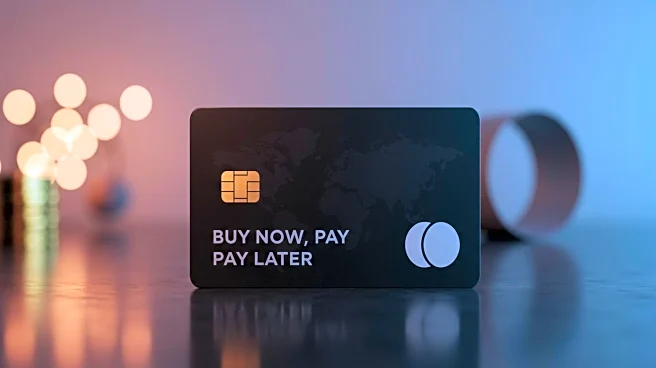What is the story about?
What's Happening?
A recent survey conducted by YouGov highlights the growing popularity of Buy Now, Pay Later (BNPL) options among credit card users in the United States. The study found that 82% of credit card holders have utilized BNPL services, which allow consumers to make purchases and pay for them over time without immediate financial burden. The survey indicates that satisfied credit card users exhibit similar purchasing behaviors to the general BNPL user base, with 22% using BNPL monthly and 28% every two to three months. The flexibility of spreading payments over time and interest-free options are among the top reasons cited by users for choosing BNPL services.
Why It's Important?
The increasing adoption of BNPL options reflects a shift in consumer preferences towards more flexible payment methods. This trend could have significant implications for the credit card industry, as traditional credit card companies may need to adapt their offerings to compete with BNPL services. The ability to spread payments and avoid interest charges appeals to consumers seeking financial convenience and budgeting flexibility. As BNPL services continue to gain traction, they may influence consumer spending habits and impact the overall credit market, potentially leading to changes in how financial institutions structure their credit products.
What's Next?
As BNPL services become more integrated into consumer purchasing habits, credit card companies may explore partnerships or develop their own BNPL offerings to retain customer loyalty. Financial institutions might also consider enhancing their credit card features to offer similar benefits, such as interest-free periods or extended payment plans. Additionally, regulatory bodies may scrutinize BNPL services to ensure consumer protection and fair lending practices, given their growing influence in the financial sector.
Beyond the Headlines
The rise of BNPL options could lead to broader discussions about consumer debt and financial literacy. While these services offer immediate purchasing power, they also pose risks of overspending and accumulating debt if not managed responsibly. Educating consumers on the potential pitfalls and encouraging responsible usage could become a focus for financial educators and policymakers.
















